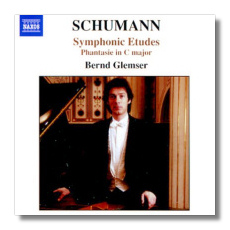
The Internet's Premier Classical Music Source
Related Links
- Schumann Reviews
- Latest Reviews
- More Reviews
-
By Composer
-
Collections
DVD & Blu-ray
Books
Concert Reviews
Articles/Interviews
Software
Audio
Search Amazon
Recommended Links
Site News
 CD Review
CD Review
Robert Schumann

Solo Piano Works
- Symphonic Etudes, Op. 13 (1834-37, rev. 1852 – 39:06)
- Fantasy in C Major, Op. 17 (1836-38 – 33:07)
Bernd Glemser, piano
Recorded Lugano, Switzerland, November 2002; Released February 2005
Naxos 8.557673 72:13
Comparisons:
Sym. Etudes – Okashiro/Pro Piano, Brand/APR, Richter/BBC, Schließmann/Bayer
Fantasy in C – Arrau/Philips, A. Fischer/BBC, Richter/EMI, Horowitz/Sony
Program: Two of Schumann's supreme piano works from the 1830's, his most inspired musical decade. After Schumann made his final revisions to the Symphonic Etudes, the work consisted of a theme with 12 variations/etudes. However, there were many interim revisions, leaving quite a few fallen etudes in their wake. After Schumann's death, Brahms took five of them and made an appendix to the work. How these five variations are treated by pianists is quite interesting and significant. Some do not play them at all, others simply restrict them to the appendix as dictated by Brahms, a few insert them together into the body of the work, and the remainder place each of the five at strategic points in the work.
It is important to point out that the final revision by Schumann, without the five additional etudes, tends to favor Schumann's alter-ego Florestan (man of action). Conversely, the etudes added by Brahms veer toward the alter-ego Eusebius (man of enlightenment). Through their strategic placement in the body of the work, a balance of alter-egos can be achieved. Personally, I see no sense in treating them as an appendix or inserting them together earlier in the work. Leaving them by the wayside seems rather foolish, given that they constitute some of Schumann's most inspirational music. Bernd Glemser takes the most desired route of strategic placement.
In contrast to the Symphonic Etudes, the Fantasy in C Major has three substantial movements closely tied to Schumann's love for Clara Wieck and the desperate state of his emotions when her father would not allow him to see her. The 1st Movement revolves around Schumann's passion for Clara, the 2nd Movement is in the form of an intense march, and the 3rd Movement expresses his undying love for his soul mate.
Glemser's Performances: Glemser does a fine job with Schumann's impetuosity and alter-egos. The problem is that many others have done better, and we have a host of recordings of both works that clearly show that Glemser is not among the best Schumann interpreters. Glemser does not approach the architectural command of Arrau or Richter, the intensity of Brand or Horowitz, the passion of Annie Fischer, the beauty of Okashiro, or the blending of alter-egos from Schließmann.
Glemser is least rewarding in the Fantasy. The passion of the 1st Movement is largely missing, and the 2nd Movement's march has a lethargic quality. However, he is excellent when conveying Schumann's great love for Clara in the gorgeous final movement.
Glemser's Sound Quality: Not very good. In the strongest passages, the sound has a rather harsh and unyielding quality; increasing the volume only exacerbates the problem. Suffice it to say that the recording doesn't possess much of a bloom to it.
Don's Conclusions: At super-budget price, I can give the new Glemser disc a mild recommendation. But there are quite a few transcendent performances on record that easily eclipse Glemser's, and those noted above in the heading should be investigated first. For a modern-era recording of the Symphonic Etudes, I especially recommend Chitose Okashiro whose disc also contains music of Scarlatti, Mozart, Chopin, Scriabin, and Brahms. Her soundstage is magnificent, and the performances are gorgeous and idiomatic. For the Fantasy, Annie Fischer's glowing warmth and passion can't be beat. These Schumann works deserve the best, and Bernd Glemser unfortunately does not reach the heights except perhaps for the 3rd Movement of the Fantasy. Essentially, this recording adds little to the Schumann discography, and other reviews I have read seem to be of like opinion.
Copyright © 2005/2006, Don Satz




















